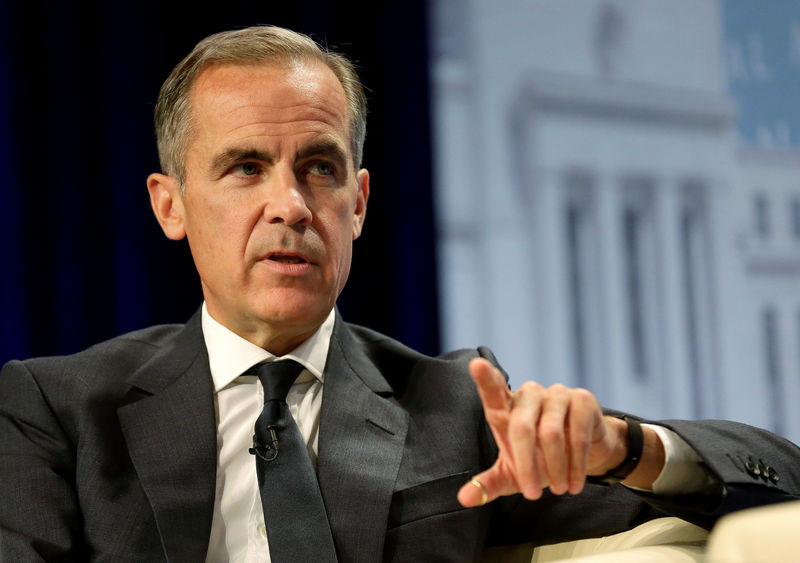By Lindsay Dunsmuir
WASHINGTON (Reuters) - Bank of England Governor Mark Carney said on Monday that Brexit is likely to hurt Britain's growth prospects in the short term and push up inflation as the country adjusts to life outside the European Union.
In a speech that immediately drew criticism from some Brexit supporters who have previously criticized his stance on the EU, Carney warned that Britain would face a cost for reworking its trade relationships.
In the short term, the weakening of trade ties with its EU partners would not be offset by new agreements with other countries, he said, as he repeated his argument from last week that interest rates would probably need to rise soon.
"This makes Brexit, relative to the experience of the past half century, unique," Carney said in a speech at the International Monetary Fund's Washington headquarters. "It will be, at least for a period of time, an example of de-globalization, not globalization."
Brexit supporters say the freedom to strike new trade deals is one of the big advantages of leaving the European Union.
Diane James, an independent member of the European Parliament who was briefly leader elect of Britain's anti-EU UKIP party, took aim at Carney.
"Mark Carney blaming inflation on Brexit. Does he not realize that QE and ZIRP are the major causes?," James said on Twitter, referring to the BoE's stimulus programs.
Carney angered many Brexit supporters before last year's referendum by saying leaving the EU would probably hurt the economy. Although growth held up immediately after the vote, it has slowed sharply this year.
Carney also said that less openness to foreign markets and fewer workers coming to Britain would put upward pressure on inflation and reduce productivity, raising the prospect of higher interest rates ahead.
"On balance, the de-integration effects of Brexit can be expected to ... be inflationary," he said. "At present, the main question concerns the extent to which this adjustment has been brought forward."
Britain's inflation rate has accelerated this year, due in large part to the fall in the value of the pound since the referendum decision in June 2016 to leave the EU.
Prices have risen nearly 3 percent - above the BoE's 2 percent target - squeezing the spending power of many households and slowing growth in the overall economy.
RATE HIKE SIGNAL REPEATED
The BoE surprised financial markets last week when it said most of its policymakers thought it was likely that interest rates would need to rise in the coming months, if the economy and price pressures keep growing.
It was the strongest signal to date that Britain's first rate increase in a decade is approaching, despite the uncertainties still surrounding the country's scheduled 2019 departure from the European Union.
In his speech on Monday, Carney reiterated that message and said the years of rock-bottom interest rates appeared to be coming to an end as the world economy picked up after the global financial crisis.
"The case for a modest monetary tightening is reinforced by the possibility that global r* (equilibrium interest rates) may be rising, meaning that monetary policy has to move in order to stand still," he said.
The pound hit its highest level against the U.S. dollar since the Brexit vote on Friday after another policymaker, Gertjan Vlieghe, who was considered the BoE's strongest opponent of a rate hike, also said borrowing costs might rise soon.
Sterling fell on Monday and after Carney's speech extended its decline, possibly reflecting the lack of specific comments from Carney on when the BoE might move on rates.
The BoE's next announcement on monetary policy is scheduled for Nov. 2.

Until last week, most economists had expected the BoE to wait until 2019 before raising rates, which would have left it on the sidelines as the Federal Reserve continues to raise borrowing costs and the European Central Bank moves toward reducing its stimulus for the euro zone economy.